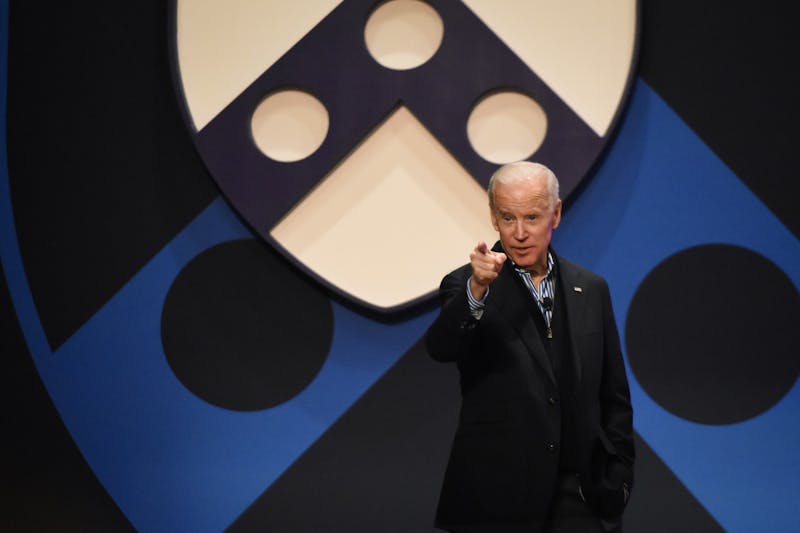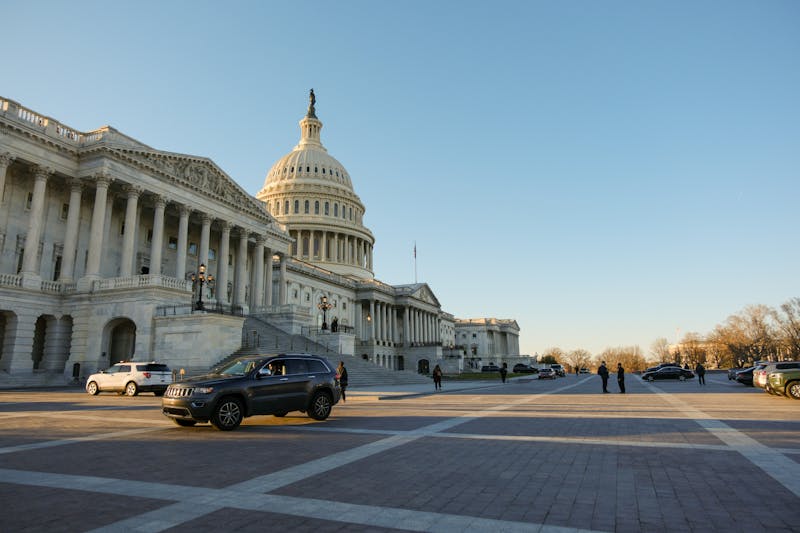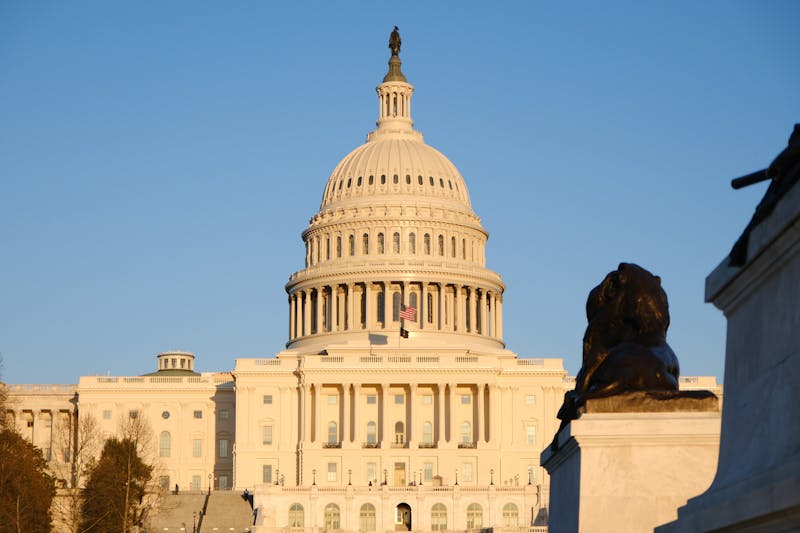
Penn has often been at the center of the political landscape throughout the past year — one which has been fraught with campus demonstrations, congressional investigations, and a shifting presidential election campaign.
As scrutiny from national media and legislators has surged during this time, the University has attracted attention in debates around elite influence, free expression, and the role of higher education in society. These conversations have increased in importance and frequency in the context of several high-profile political figures with strong ties to the University — most notably, 1968 Wharton graduate Donald Trump and former Penn professor President Joe Biden.
Penn has also drawn criticism and media attention for affiliated institutions such as the Penn Wharton Budget Model and Penn Biden Center.
Trump and Biden
Trump has often referred to his Ivy League credentials — particularly his status as an alumnus of the Wharton School — on the campaign trail. While Trump has distanced himself from this aspect of his record and mentioned his Wharton education less during this campaign season, he has done so in contexts more pertaining to economic policy and business acumen.
Throughout the past election cycle, Trump — as has been the case for much of his career — has been involved in much political discourse and controversy.
In late 2023 and early 2024, Trump was disqualified from several states' primary election ballots after they ruled him ineligible due to his role in inciting an insurrection on the Capitol. In March, the United States Supreme Court unanimously ruled to allow Trump to appear on Colorado and Maine primary ballots, overturning the previous Colorado Supreme Court decision.
In July, Trump's legal woes continued as he was convicted on 34 felony counts for falsifying business records tied to a hush-money payment to adult film star Stormy Daniels during his 2016 campaign, marking the first time a former U.S. president has been found guilty of a crime.
The same month — following a performance in June's presidential debate widely panned by viewers and media analysts — Biden announced his decision to withdraw from the presidential race, citing his commitment to serving the remainder of his term and endorsing Vice President Kamala Harris as the Democratic nominee. A few months later, Biden expressed his desire to reengage with the Penn Biden Center after his term, building on his prior involvement with the think tank.
Biden has also been embroiled in controversy over classified documents from his vice presidency which were discovered at the Penn Biden Center in November 2022, prompting an investigation by the Department of Justice.
The House Oversight and Accountability Committee soon opened an investigation into the Penn Biden Center, requesting data on foreign donations, particularly from China, and lists of visitors and employees, citing concerns about foreign influence and potential access to classified materials. Penn, in response to these allegations, said that the center received no foreign funds and affirmed compliance with federal reporting laws on foreign donations.
Special Counsel Robert Hur was also assigned in early 2023 to examine the origins and handling of these documents.
Despite finding that Biden had “willfully retained” classified information, Hur’s report, released in February 2024, concluded there was insufficient evidence to prosecute, partly due to Biden’s full cooperation and his perceived lack of malicious intent. Hur also critiqued Biden's mental acuity in the report, saying that he would appeal to a jury as a “sympathetic, well-meaning, elderly man with a poor memory.”
In recent months, Penn Wharton Budget Model — a nonpartisan initiative launched by Wharton — has been a subject of significant dispute and discussion in the presidential campaign. PWBM released an analysis indicating that Trump’s 2024 economic policy proposals would significantly increase the federal deficit. This assessment was referenced by Harris during her September debate with Trump, who argued that the GOP nominee’s plan would inflate the national deficit by an estimated $5.8 trillion over the next decade.
Trump responded by citing his Penn background, claiming support from Wharton’s “top professors” for his plans. The analysis was similarly referenced by both candidates during the vice presidential debate.
Campus controversies and investigations
Penn has also found itself at the epicenter of a national debate over free speech and student activism following the Oct. 7, 2023 Hamas attacks on Israel and the ensuing Israel-Hamas War. Campus demonstrations throughout fall 2023 attracted national attention over alleged antisemitism on Penn’s campus and bipartisan scrutiny over the University's response to it.
Penn’s administration attempted to clarify its commitment to free expression in response to the controversy, but criticism continued to escalate until a Dec. 5, 2023 hearing in which former Penn President Liz Magill testified before Congress. Magill received substantial criticism for an interaction with Rep. Elise Stefanik (R-N.Y.) during which Magill said that whether calls for the genocide of Jews constitute violations of Penn's code of conduct is "context dependent."
Criticism of Magill intensified in the following days, including dozens of congresspeople calling for Magill's removal in separate letters and a House committee opening an investigation into Penn with the threat of subpoenas. Magill resigned the presidency on Dec. 9, 2023.
At least three federal bodies, including the House Committee on Education and the Workforce, the House Oversight Committee, and the Department of Education, opened investigations around this time into Penn’s handling of antisemitism on campus, including whether the University upheld its obligations under Title VI of the Civil Rights Act.
The House Committee on Education and the Workforce was the first to do so, initiating a formal investigation into Penn and peer institutions in December 2023 following Magill's testimony. The House Ways and Means Committee joined in January 2024, threatening the University’s tax-exempt status due to alleged negligence in safeguarding Jewish students on campus.
Chair Jason Smith (R-Mo.) requested detailed policies and questioned whether Penn’s diversity, equity, and inclusion programs effectively support Jewish students.
In late December 2023, the Pennsylvania House of Representatives withheld $31 million in funding for the University's School of Veterinary Medicine over concerns of antisemitism. While the Commonwealth later allocated Penn funding in the 2024-25 fiscal year budget, the University has still not received the initial funding withheld in late 2023.
Four months later, the House expanded its probe into antisemitism on college campuses, with Speaker of the House Mike Johnson (D-Mo.) announcing a House-wide investigation. Johnson emphasized Congress's duty to ensure a safe educational environment for Jewish students, citing concerns over alleged “ongoing and pervasive acts of antisemitic harassment and intimidation” on campus.
The broadened investigation explored the University’s federal fund usage and campus policies through the respective jurisdictions of six congressional committees and remains active to date.
Amid summer preparations for the academic year, the Education and Workforce Committee and Ways and Means Committee sent a letter in August 2024, urging Penn to reinforce measures against potential campus disruptions and antisemitic conduct. The letter warned of upcoming demonstrations likely to resurface, pressing Penn to update policies to effectively handle such occurrences.
The Daily Pennsylvanian is an independent, student-run newspaper. Please consider making a donation to support the coverage that shapes the University. Your generosity ensures a future of strong journalism at Penn.
Donate












